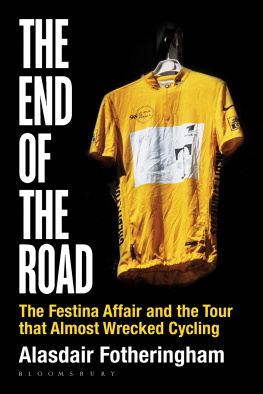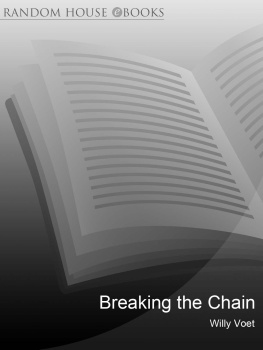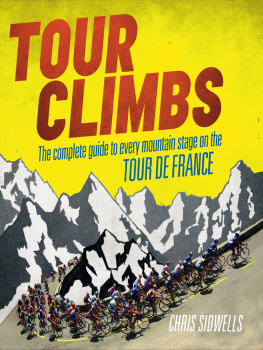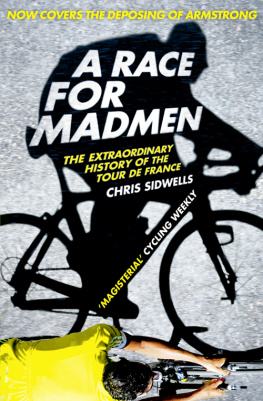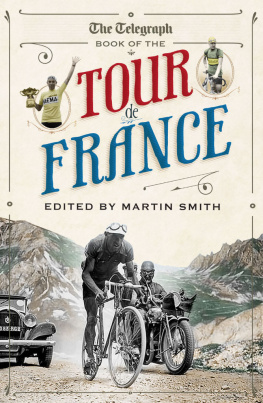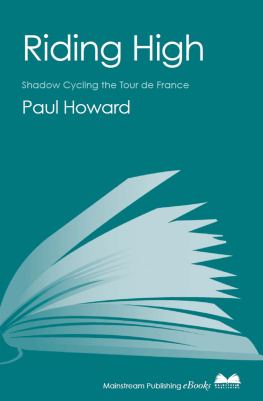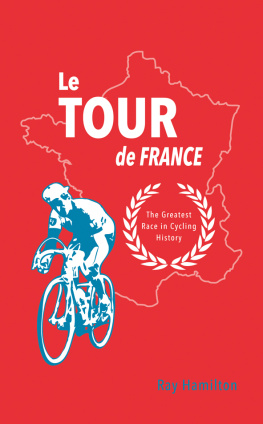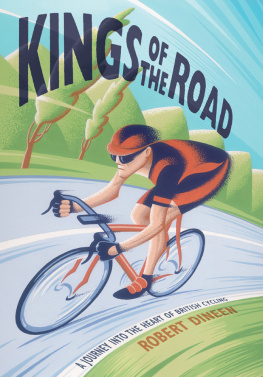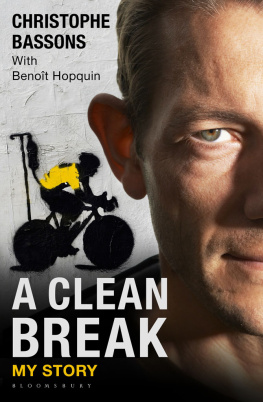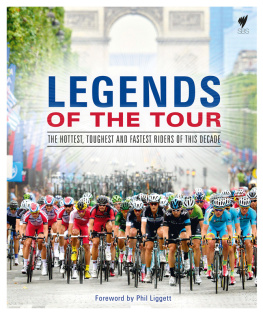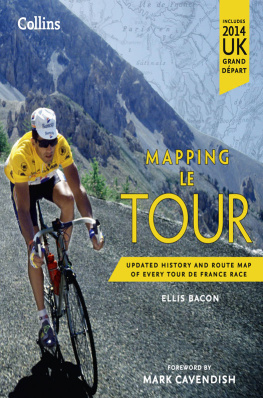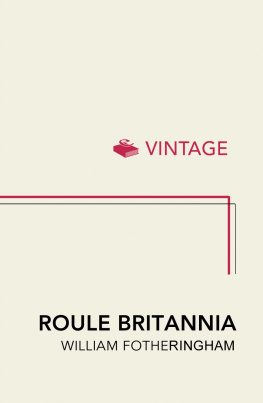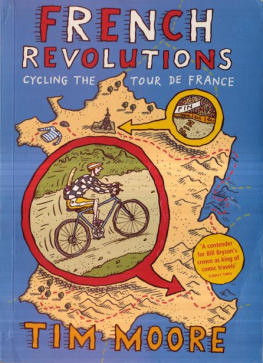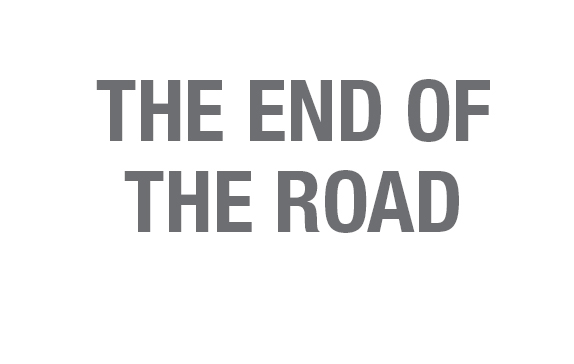

This book is dedicated to the memory of my father, Alex, who managed to write himself a cameo role in my recollections of the 1998 Tour after he came over to Dublin to see the Tour prologue and first stage. A bookseller by trade, my father also made the most of his visit to do a little bookdealing as he would always do whenever he travelled any further than the end of his garden. But what was much more surprising was when he also somehow managed to inveigle his way past Dublin Castle security (no small matter in 1998 at least, and without a press pass, too) and into Bruno Roussels press conference, standing behind a wooden screen to listen. After listening to Roussels dismally inadequate explanation concerning Willy Voets absence, my father came striding out from his hiding place and uttered in a theatrical whisper to me what proved to be very prescient words: what on earth is going to happen now?
Contents
Saturday, 11 July. Prologue: DublinDublin, 5.6 km
He stared at the toilet bowl, flushing away his drugs into Dublins sewers. This should have been a highlight of his Tour, his year his career, even. Because no matter how hardened the professional bike rider, taking part in a Tour de France prologue cannot fail to produce a little gooseflesh, a dash of anticipation. Cheered on by crowds lining the whole route for most of the peloton as they ride round, soaking up the applause, a Grand Tour prologue is a pleasurable, inconsequential reminder that they have made it to the pinnacle of the sport. As one-time Festina pro Christophe Bassons once put it: Eight minutes and 46 seconds of elation. It couldnt get much better than that.
But for Rolf Aldag, a much valued domestique or team worker in the Telekom team for defending Tour champion Jan Ullrich, in Dublin it couldnt get much worse. Paranoia had kicked in, nerves were frayed to breaking point. At the very beginning of the Tour, it must have felt like the end of the road. His abiding memories of the 1998 Tours start have nothing to do with racing at all. They have been eclipsed by recollections of sitting staring at a flushing toilet bowl in his team hotel room, watching his banned drugs spin out of sight, if not out of mind, as fast as possible.
Aldag was panicking for one simple, devastating reason: the arrest of Willy Voet, a soigneur from arch-rivals Festina, a few days earlier on the Franco-Belgian border. En route to the Tour de France, Voets team car had been found to be packed with an arsenal of illegal drugs. Everything was there that a team could need for a three-week race: 86 vials of human growth hormone (HGH) in two different formats, 60 capsules of Epistosterone, 248 vials of physiological serum, eight syringes containing hepatitis A vaccine, two boxes of Hyperlypen tablets (to lower fat levels in the blood), four ampules of Synacthene (to increase corticoid hormone production), two vials of amphetamines. And, most importantly of all, 234 doses of the banned, undetectable blood booster EPO.
In comparison, Aldag had in his suitcase just EPO at the time the pelotons drug of choice. Nor was Voet providing gear for the Telekom team. However, given Voets arrest, and the waves of fear that an unprecedented arrest of this kind induced in a peloton where a significant percentage were involved in illegal doping, Aldag could only see one course of action: Flush it and peel the label off and put it in a plastic bag and really jump on it, those ampoules, and dont just put them in the trash, because there might be a policeman or journalist watching. We were so sure there was somebody in the hotel building following us, cars out there following us, so we had to stamp it into small pieces and get rid of it in the toilet. There it goes, 300 euros.
Aldag argues this was not due to a sudden crisis of conscience: he, and many riders in the peloton, were well past that stage. Rather, this action was born purely out of fear of the police and French prisons.
People were really screwed in their heads. Everybody was so confused. We pretended to be shocked about Festinas soigneur, and then we realised we had got so lucky. It was like, now what [do we do with our own supply]?
For me, I didnt have a lot. It was already crazy to take it in my suitcase, but nobody was really aware of how wrong it was at that stage. It was part of the deal. It was only when the Festina scandal broke that it was like: OK, shit.
Somehow, suddenly, it felt as if the ground had shifted underneath the riders, and nobody could predict the consequences. All the riders knew was they were vulnerable. And so was the Tour de France, the pinnacle of their sport.
When you build a house of cards it is inevitable that one day it will collapse, no matter how firm a foundation you thought you had put down. But in Rolf Aldags case, long before Willy Voets arrest left him feeling as if his cycling world could cave in at any minute, the German had also formed part of Telekoms spectacular rise to power in his sport. Their ascendancy, as Aldag sees it, didnt start with Jan Ullrich winning a Tour or any other rider succeeding: rather, it started with his teams radical change in racing mentality, on a day it didnt win. And it was all thanks to a tall, quiet, balding Dane whose biggest claim to fame up until then was as a Tour general classification (GC) outsider: third in the 1995 race, but not a likely winner in anyones book, least of all Telekoms.
It was a stage in the Midi Libre, 1996, Aldag, blessed with a crystal-clear recollection of such incidents, recalls. There was a big, big break with all the top names in it Rominger, Indurain, strong guys like [1994 Tour leader] Flavio Vanzella And Bjarne [Riis] suddenly drops back to us in the bunch and says, we have to chase. And were like, hello, where have you been for the last five years? This Indurain guy, hes won the Tour a few times recently, and Bjarne just says again we chase.
So we did. We chased all day. And we caught them 15 kilometres from the line. And the question we answered to ourselves that day was, if we can catch these guys, why would we ever panic in the Tour? Who can attack that we cant pull back? It made us mentally so strong, that in the Tour there was no panic. Its just a matter of time and resistance: we will catch them. That was the big change. Bjarne was the team captain. He guided people and influenced them. The rest of us were too similar.
On a single day Telekom went from being the rudderless formation of previous years to a squad which suddenly gained the self-belief it needed to win the Tour twice in a row, in 1996 and 1997. In 1995, Telekom had raced the Tour as part of a joint squad with ZG Mobili, winning two stages with Zabel. Yet as only half a team and no overall contender to boot, Telekom could hardly be described as a key factor in the race. But 12 months later, Telekom gained a real sense of upwardly mobile purpose: suddenly it felt like anything was possible.
The 1996 Tour victory with Riis, Aldag now a top team director argues was the nicest of our victories because we were completely underestimated. I remember they had interviewed Bjarne during the previous winter, and he said he wanted to win the Tour. And we [the rest of the Telekom team] were all sitting in a room nearby and killing ourselves laughing listening to him, saying to ourselves, theres this guy [Miguel Indurain] whos just won the Tour five times, whats so different now?

